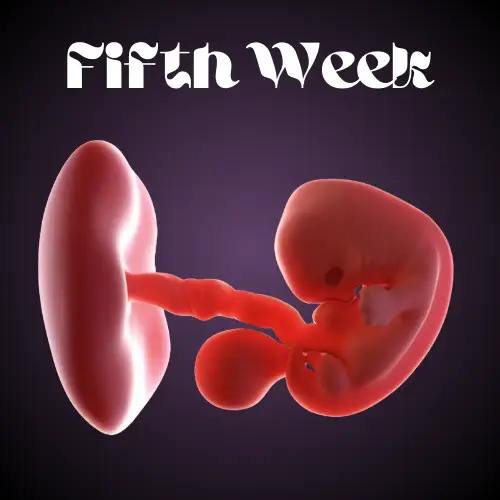Fifth Week of Pregnancy: Symptoms, Baby Development, and Tips
The fifth week of pregnancy marks the beginning of an exciting and transformative journey. At this stage, your body is undergoing significant changes to support the growth of your baby. This week is crucial as the embryo begins to develop rapidly, and you may start noticing early pregnancy symptoms. Understanding what to expect during this time can help you navigate the changes and ensure a healthy pregnancy.

What Happens in the Fifth Week of Pregnancy?
During the fifth week of pregnancy, the fertilized egg has implanted itself in the uterine lining, and the embryo is beginning to grow. This is a critical period for development, as the foundation for your baby’s major organs and systems is being laid.
Confirming Your Pregnancy
By the fifth week, you may have already taken a home pregnancy test, which detects the presence of the hormone hCG (human chorionic gonadotropin) in your urine. If the test is positive, it’s a good idea to schedule an appointment with your healthcare provider to confirm the pregnancy and begin prenatal care.
Understanding Early Pregnancy Hormones
The hormones hCG, progesterone, and estrogen play vital roles in maintaining the pregnancy. hCG is responsible for signaling the corpus luteum to continue producing progesterone, which is essential for maintaining the uterine lining. Estrogen supports the growth of the uterus and the development of the placenta.
Your Baby's Development at Week 5
Embryo Growth
At this stage, the embryo is about the size of a sesame seed, measuring around 1-2 millimeters in length. Despite its small size, rapid development is occurring.
Formation of Major Organs
The neural tube, which will eventually form the brain and spinal cord, begins to develop. The heart is also starting to form and will soon begin to beat. Other major organs, such as the liver, kidneys, and lungs, are in the early stages of development.
Common Symptoms in the Fifth Week
Morning Sickness
Nausea and vomiting, often referred to as morning sickness, can begin around this time. Despite the name, it can occur at any time of the day.
Fatigue and Mood Swings
Increased levels of progesterone can cause extreme fatigue and mood swings. Your body is working hard to support the growing embryo, which can leave you feeling exhausted.
Increased Urination
The growing uterus may start to press on your bladder, leading to more frequent trips to the bathroom.
Breast Tenderness
Hormonal changes can cause your breasts to become tender, swollen, or sore.
Food Cravings and Aversions
You may start to experience cravings for certain foods or aversions to others. These changes are influenced by hormonal fluctuations.
Hormonal Changes in the Fifth Week
The Role of HCG
HCG levels continue to rise, supporting the corpus luteum and ensuring the production of progesterone.
Progesterone and Estrogen Levels
Progesterone helps maintain the uterine lining and prevents contractions that could lead to early labor. Estrogen supports the development of the placenta and the growth of the uterus.
Changes in Your Body
Weight Gain or Loss
Some women may experience slight weight gain due to increased blood volume and fluid retention, while others may lose weight due to morning sickness.
Bloating and Digestive Issues
Hormonal changes can slow down digestion, leading to bloating, constipation, or gas.
What You Should Eat During the Fifth Week
Essential Nutrients
Focus on a balanced diet rich in folic acid, iron, calcium, and protein. These nutrients are crucial for the development of the embryo and your overall health.
Foods to Avoid
Avoid raw or undercooked meats, unpasteurized dairy products, and high-mercury fish. Limit caffeine and avoid alcohol and smoking.
Tips for a Healthy Fifth Week of Pregnancy
Managing Stress
Practice relaxation techniques such as deep breathing, meditation, or prenatal yoga to manage stress.
Staying Active
Engage in light to moderate exercise, such as walking or swimming, to maintain your fitness and reduce stress.
Hydration and Sleep
Stay hydrated by drinking plenty of water and aim for 7-9 hours of sleep per night to support your body’s increased demands.
When to See a Doctor?
mportant Symptoms to Watch For
Contact your healthcare provider if you experience severe abdominal pain, heavy bleeding, or persistent vomiting, as these could indicate complications.
Lifestyle Adjustments
Avoiding Harmful Substances
Avoid alcohol, tobacco, and recreational drugs, as they can harm the developing embryo.
Importance of Prenatal Vitamins
Continue taking prenatal vitamins, especially those containing folic acid, to support the development of the neural tube and prevent birth defects.
Common Concerns in Week 5
Ectopic Pregnancy Risks
An ectopic pregnancy occurs when the embryo implants outside the uterus, usually in the fallopian tube. Symptoms include severe abdominal pain and vaginal bleeding. Seek medical attention immediately if you suspect an ectopic pregnancy.
Early Pregnancy Miscarriage Risks
Miscarriage is most common during the first trimester. Symptoms include heavy bleeding and cramping. If you experience these symptoms, contact your healthcare provider.
Partner’s Role in the Fifth Week
Your partner can provide emotional support and help with household tasks, especially if you’re feeling fatigued or nauseous. Open communication about your feelings and needs is essential.
Emotional Changes and Mental Health
Pregnancy can bring about a range of emotions, from joy and excitement to anxiety and fear. It’s important to talk about your feelings with your partner, friends, or a healthcare provider.
What to Expect in the Coming Weeks?
In the coming weeks, your baby’s development will continue at a rapid pace. You may start to notice more pronounced pregnancy symptoms, and your first prenatal appointment will likely include an ultrasound to confirm the pregnancy and check the baby’s development.
FAQs
1. Can I still exercise during the fifth week of pregnancy?
Yes, light to moderate exercise is generally safe and beneficial. However, consult your healthcare provider before starting any new exercise routine.
2. What should I do if I experience severe morning sickness?
If morning sickness is severe and persistent, contact your healthcare provider. They may recommend dietary changes, medications, or other treatments.
3. Is it normal to have spotting in the fifth week?
Light spotting can be normal, but it’s important to contact your healthcare provider to rule out any complications.
4. How can I manage fatigue during the fifth week?
Ensure you’re getting enough rest, eating a balanced diet, and staying hydrated. Don’t hesitate to ask for help with daily tasks.
5. When will I have my first prenatal appointment?
Most healthcare providers schedule the first prenatal appointment between 8-12 weeks of pregnancy. However, if you have any concerns or symptoms, contact your provider sooner.
Conclusion
The fifth week of pregnancy is a time of significant changes and development. By understanding what to expect and taking steps to care for your body and mind, you can support a healthy pregnancy. Remember to stay in close contact with your healthcare provider and seek support from your partner and loved ones.
